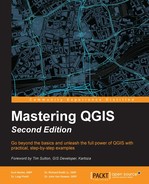Since the QGIS project was started in 2002 by Gary Sherman, the project has done what many people would have thought to be impossible—provide a viable alternative to the incumbent de facto GIS applications that is free, open source, and accessible to everyone on this planet who owns a computer. One of the joys of contributing to and participating in the QGIS project has been watching how the community of people and the body of knowledge have grown up around the project. There are few better examples of this than the work Kurt, Rick, John, and Luigi (the four co-authors of this book) have put into Mastering QGIS.
Writing a book about QGIS is no easy task, partly because of the sheer depth of functionality that QGIS offers, and partly because of the fact that QGIS is rapidly evolving. In creating this second edition of Mastering QGIS, the authors have added some great new content to cover some of the important new functionality that has been added to QGIS. They have also revised the existing content to ensure thay everything is still fresh and relevant to QGIS 2.14.
Having such an in-depth book about QGIS really lowers the barrier of entry to learning, and mastering, QGIS. I am looking forward to the day when GIS is used as commonly and routinely as a spreadsheet or a word processor. Being able to visualize and analyze the world around us is the most basic necessity if we are to promote good stewardship of the earth, responsible decision making, and humane and equitable conditions for the people that inhabit the earth. QGIS is a key element in this equation—being free and open source software really does make QGIS something that can be used by anyone on this planet who has access to a computer. Mastering QGIS provides a fantastic resource for those who wish to take full advantage of the opportunity offered by QGIS by having someone to guide them in their learning endeavors.
As you delve deeper into the world of QGIS and all the great things that the authors have to show you, take a moment to join our community (http://qgis.org), or start your own local community in your country. We welcome your participation and contribution of ideas, bug reports, code, and documentation, and we welcome you to the diverse and ever-growing group of people all around the world who are using QGIS to make the world a better place!

Happy QGISing!
Tim Sutton,
QGIS Project Chairman
